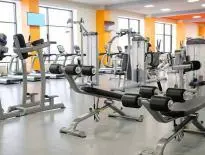I’m certain you’ve experienced or known someone who’s experienced a slower metabolism with age.
But why does this happen?
Do our cells just slow down when we get older? Not exactly.
Are there other influencing factors? You bet!
But all in all, it’s far more complicated than “cells slowing.”
Glynn’s Guide:
Takeaways That Won’t Fail You
- We have control of most of the factors that have an impact on our metabolism.
- Sleep, caloric intake, body weight, exercise and stress play key roles in our metabolic rate.
- Insulin may be the most important hormone we have some control over affecting our metabolism.
- Cortisol plays a large role in which we have control via our stress levels.
Table of Contents
Click to Jump to a Section
Do our hormones play a key role in a “slowing metabolism” or are other factors at play?
Which hormones are the most influential players?
Why have I zeroed in on insulin?
How can we improve insulin sensitivity?
What about other factors: sleep, exercise/activity level & bodyweight?
What are the most influential factors negatively affecting metabolism (greatest to least)?
In conclusion: what can YOU do to elevate your metabolism as you age?
Metabolism FAQ
Resources and References
A big factor comes down to hormones and hormone sensitivity. Other factors include sleep, diet and fitness level (to state the obvious). With that in mind, let’s dissect this annoying “slow down.”
First, I need to disclose there’s a great deal more research to be done. Our microbiome and genetic makeup play a huge role in our response to foods and external factors. But, we still have enough control to have a significant impact!
In other words, don’t wait for research to evolve. Get started on improving your nutrition and habits now to age well.
Do our hormones play a key role in a “slowing metabolism” or are other factors at play?
I believe it comes down to our hormone levels, sensitivity to those hormones and five external factors. We need to look at the big picture and how some of these factors interact.
And of course, several life habits poorly affect our hormones.
See the cycle???
It all counts. And that’s why I consider internal and external factors to be equal.
This being the case, one could speculate that controlling for these variables would contribute to staying lean as we age. And that’s what this article is about. Not just what causes the “slow down,” but a few solutions.
Which hormones are the most influential players?
I’ll list only the “global” hormones that you’re likely familiar with already.
There are certainly more hormones that have an influential role, but some are beyond the scope of my expertise. Besides, we have less control over some of the more finite hormones involved.
Let’s first discuss each hormone individually.
Growth Hormone
Growth hormone begins to decline after the second decade of life. But what influence does growth hormone have on our weight/metabolism?
It plays a role in amino acid uptake and fat mobilization from storage. In other words, it plays a solid role in building muscle and burning fat.
Sleep quality plays a big role in growth hormone secretion. I’ll discuss that in more detail below.
So what can we do to improve GH levels as we age?
- Make quality sleep a priority. I can’t stress this enough!
- Heavy, intense strength training.
Testosterone
As far as metabolism is concerned, testosterone’s biggest influence is on muscle protein synthesis.
This may be anecdotal, but whenever I watched the bodybuilders who “raised me” do a cycle of testosterone, they would become leaner. This was without a dietary change. I’m certainly not promoting the use of exogenous testosterone (steroids) without being monitored medically. I’m merely stating an observation.
What can we do to improve testosterone levels as we age?
- Incorporate heavy, intense strength training.
- Avoid the elimination of quality fats.
- Make sure you’re getting enough Vitamin D.
- Make sure you’re getting a consistent 7-8 hours of sleep.
Luteinizing hormone (LH)
Luteinizing hormone (LH) stimulates ovulation in women. And it stimulates testosterone production in men. Testosterone production occurs in the Leydig cells located in the testes.
The Leydig cells respond to a signal from the Luteinizing hormone (LH). Well, it turns out, they become less sensitive to the signal as men age. We could say, they lose their hearing. This result is less testosterone.
This is one aspect of a hormonal change affecting metabolism that we males have less control over.
Cortisol
Cortisol is a glucocorticoid and plays a serious role in the metabolism of most cells in the body.
Yes, cortisol assists in the mobilization of fat for energy. And it also promotes gluconeogenesisthe construction of glucose from a noncarbohydrate source. But it plays a big role in the breakdown of stored amino acids for use in gluconeogenesis. You can read that as “muscle breakdown.”
Our cortisol levels rise and fall on a natural rhythm (down at night and high after awakening). But the stress of all kinds can cause a disruption of the rhythm and consistently elevate cortisol levels. This makes it difficult to build and keep lean muscle tissue.
But, all of that said, significantly elevated cortisol levels suppress the immune system and are a hallmark of aging.
Insulin (I saved the best for last)
Insulin is a hormone for which most of you are very familiar. So, I’ll briefly summarize its function.
Insulin is produced in the pancreas (which makes the pancreas a very important organ). It directs our metabolism in a fed state. Remember that statement!
Insulin is secreted in response to an elevated level of blood glucose (sugar). It pushes glucose from the bloodstream into cells. But that’s not all.
So, what else does it do aside from dealing with blood glucose?
- Insulin activates or inhibits many of our enzymes.
- It also assists in the transport of amino acids into the cell.
- Glycogen synthesis (stored glucose) is stimulated by elevated insulin.
- Glycogen breakdown is “turned off” when insulin output is elevated.
- Fatty acid synthesis is stimulated.
- Triacylglyceride synthesis is “turned on” in the adipose tissue (body fat).
- Lipogenesis is stimulated. Read that as fat production.
- Protein synthesis. This is crucial for muscle protein synthesis.
Yes, that’s a lot. And that’s why I consider it a “conductor” of the orchestra. Problem is, we eat too much of the foods that stimulate excess insulin secretion. Then we become insensitive to insulin.
Why have I zeroed in on insulin?
I believe insulin plays the largest role in a slowed metabolism. Why?
Two reasons:
- It’s the “director” of so many metabolic functions in our body (conductor of the orchestra) and,
Unless you have insulin-dependent diabetes (type 1), insulin is one particular hormone that we have a lot of control over. - Yes, as we age, there is a potential for the cells in the pancreas that secrete insulin (ß cells) to produce less. This, we cannot control for, but other aspects, we can.
There is an unprecedented amount of research that shows excess weight as abdominal fat increases insulin resistance.
One could even say that this excess fat creates a perpetual cycle to gain more fat as we age. In other words, a “slowed metabolism.”
Here’s the cycle:
- We become less sensitive to insulin because of many of the factors listed.
- Our pancreas makes more insulin to make up for the insensitivity.
- The elevated levels promote weight gain in the form of fat.
- The cycle repeats…
How can we improve insulin sensitivity?
Amait stated,
Insulin resistance may not be characteristic of aging but rather associated with obesity and physical inactivity.
That certainly simplifies what’s necessary to improve insulin sensitivity.
Simply increasing one’s physical activity and shedding some weight will improve insulin sensitivity. If I may be so bold, this translates into an improved metabolism.
So, what can we do to improve our response to insulin?
- All types of exercise improve our response to insulin at any age.
- Lose fat weight.
- Eliminate most of the sugar from your diet. Please note that sugar keeps popping up as an issue.
- Restrict calories. This is where intermittent fasting can be beneficial. You can read more about it in my article: What is Intermittent Fasting? [Does it Work?].
What about other factors: sleep, exercise/activity level & bodyweight?
Sleep
As you age, slow-wave deep sleep (stage 4 and 5) declines because of more frequent disruption of sleep.
Sleep has a large influence on the endocrine system. It’s believed that the majority of growth hormone secretion occurs during the early phases of slow-wave sleep. This decline in growth hormone contributes to:
- Diminished amino acid uptake into cellular proteins.
- Minimized fat mobilization from storage.
Additionally, a disruption in sleep may also contribute to a depressed immune system. This response is hormone related, but it involves the lesser-known interleukin-6. Just know that a lack of sleep has a negative impact on your immune system too.
Also, fragmented sleep raises cortisol levels for several days. This contributes to the breakdown of muscle tissue. We already lose enough muscle with age, no need to stoke the fire.
But most importantly, a great diet and exercise program is severely compromised if you’re not getting enough sleep. In other words, it’s one of the most important factors we can control.
Caloric Intake
Clearly, excess calories will always result in weight gain. But the wrong calories (sugar) will contribute faster to insulin insensitivity.
We have the most control over caloric intake, period. No one forces you to eat what you eat, so it’s always your decision. There’s a profound amount of research linking (not correlating) a low-calorie diet with:
- Prevention of obesity, diabetes, hypertension and chronic inflammation
- Reduced glucose and insulin concentration
- Improved insulin sensitivity
- Slower aging
And yes, intermittent fasting is shown to have similar benefits in a more manageable style. I think it’s the easiest way to maintain healthy caloric intake.
So, too many calories contribute to other pathways that slow one’s metabolism. And too few calories have the same effect.
Exercise
Exercise increases glucose sensitivity in skeletal muscle. In other words, your muscles become more of a sponge for glucose and amino acids.
Nonetheless, the benefits of exercise are so extensive, that it would take an entire article to list. But a lack of exercise is a large contributor to a “slower metabolism.”
Of course, all the benefits of exercise are lost if one fails to make it a part of their life.
Bodyweight
Excess body weight, especially in the abdomen, decreases sensitivity to insulin. This, of course, takes us back to the most influential hormone, insulin.
In other words, maintain healthy body weight and a “slowed metabolism” is less likely.
Stress
Why did I include stress in this section? Well, being humans, many of us seem to have elevated stress levels as we age. And since stress has a real impact on cortisol levels, it’s worth including.
If you recall earlier in the article, I mentioned the loss of lean muscle tissue is something most of us want to avoid. Elevated cortisol levels contribute to this loss. More stress = elevated cortisol = difficulty maintaining lean muscle tissue.
What are the most influential factors negatively affecting metabolism (greatest to least)?
This is my educated and experienced opinion. And it’s applicable to anyone who wants to improve their health and fitness at any age.
- Excess sugar intake.
- Lack of sleep.
- Excess caloric intake.
- Lack of exercise.
- Too much stress.
Concluson: What can YOU do to elevate your metabolism as you age?
I’ll list in order of greatest to least effective based on my educated opinion and experience.
- Caloric restriction focusing on the elimination of simple carbohydrates (sugar)
- Consistently maintaining 7-9 hours of quality sleep.
- Exercise in the form of both strength training and cardiovascular.
- Intermittent fasting. I would not have made this statement two decades ago, but I’ve reviewed enough research and experienced the proof.
- Maintenance of low body weight.
Slowing Metabolism FAQs
Will slow metabolism make you fat?
It’s the chicken or the egg scenario… Excess body weight decreases insulin sensitivity. This leads to excess insulin production and more fat storage.
Can metabolism slow down?
Yes, it’s a change in how our body responds to certain hormones. This change is influenced by body weight, sleep quality, diet, and activity level.
How to increase slow metabolism?
Exercise, eliminate most sugars, maintain a caloric balance and get 7-8 hours of sleep.
Why does metabolism slow down with age?
I believe most of the influence begins with external factors. They are sleep, caloric intake, exercise, and stress. These factors affect how we respond to key hormones that control our metabolism.
Slow Metabolism References and Resources
Francesca Amati, John J. Dubé, Paul M. Coen, Maja Stefanovic-Racic, Frederico G.S. Toledo, Bret H. Goodpaster, Physical Inactivity and Obesity Underlie the Insulin Resistance of Aging, Diabetes Care Aug 2009, 32 (8) 1547-1549.
Andrzej Bartke (2008) Insulin and aging, Cell Cycle, 7:21, 3338-3343.
Annette M. Chang and Jeffrey B. Halter, Aging and insulin secretion, American Journal of Physiology-Endocrinology and Metabolism 2003, 284:1, E7-E12.
Julie H. Cox, Ronald N. Cortright, G. Lynis Dohm, and Joseph A. Houmard, Effect of aging on response to exercise training in humans: skeletal muscle GLUT-4 and insulin sensitivity, Journal of Applied Physiology 1999, 86:6, 2019-2025.
Van Cauter E, Leproult R, Plat L. Age-Related Changes in Slow Wave Sleep and REM Sleep and Relationship With Growth Hormone and Cortisol Levels in Healthy Men. JAMA. 2000;284(7):861–868.
Raymond I. Fink, Orville G. Kolterman, Jennifer Griffin, Jerrold M. Olefsky, Mechanisms of Insulin Resistance in Aging, J Clin Invest. 1983; 71(6): 1523-1535.
Fullagar, H.H.K., Skorski, S., Duffield, R. et al. Sleep and Athletic Performance: The Effects of Sleep Loss on Exercise Performance, and Physiological and Cognitive Responses to Exercise. Sports Med (2015) 45: 161.
Matthew P. Hardy, Peter N. Schlegel, Testosterone Production in the Aging Male: Where Does the Slowdown Occur?, Endocrinology, Volume 145, Issue 10, 1 October 2004, Pages 4439–4440
J. W. Kemnitz, E. B. Roecker, R. Weindruch, D. F. Elson, S. T. Baum, and R. N. Bergman, Dietary restriction increases insulin sensitivity and lowers blood glucose in rhesus monkeys, American Journal of Physiology-Endocrinology and Metabolism 1994 266:4, E540-E547
W. J. Kraemer, B. A. Aguilera, M. Terada, R. U. Newton, J. M. Lynch, G. Rosendaal, J. M. McBride, S. E. Gordon, and K. Hakkinen, Responses of IGF-I to endogenous increases in growth hormone after heavy-resistance exercise, Journal of Applied Physiology 1995 79:4, 1310-1315.
Wendy M Kohrt, John P Kirwan, Myrlene A Staten, Raymond E Bourey, Douglas S King, John O Holloszy, Insulin Resistance in Aging Is Related to Abdominal Obesity, Diabetes Feb 1993, 42 (2) 273-281.
Nimptsch, K., Platz, E. A., Willett, W. C. and Giovannucci, E. (2012), Association between plasma 25‐OH vitamin D and testosterone levels in men. Clinical Endocrinology, 77: 106-112.
Pilz, S.; Frisch, S.; Koertke, H.; Kuhn, J.; Dreier, J.; Obermayer-Pietsch, B.; Wehr, E.; Zittermann, A., Effect of Vitamin D Supplementation on Testosterone Levels in Men, Hormone and Metabolic Research 2011; 43(03): 223 – 225.
Laura Redwine, Richard L. Hauger, J. Christian Gillin, Michael Irwin, Effects of Sleep and Sleep Deprivation on Interleukin-6, Growth Hormone, Cortisol, and Melatonin Levels in Humans, The Journal of Clinical Endocrinology & Metabolism, Volume 85, Issue 10, 1 October 2000, Pages 3597–360
Shah, K., Stufflebam, A., Hilton, T. N., Sinacore, D. R., Klein, S. and Villareal, D. T. (2009), Diet and Exercise Interventions Reduce Intrahepatic Fat Content and Improve Insulin Sensitivity in Obese Older Adults. Obesity, 17: 2162-2168
Zvi Zadik, A. Chalew, Robert J. McCarter, Mary Meistas, A. Avinoam Kowarski, The Influence of Age on the 24-Hour Integrated Concentration of Growth Hormone in Normal Individuals, The Journal of Clinical Endocrinology & Metabolism, Volume 60, Issue 3, 1 March 1985, Pages 513–516.




